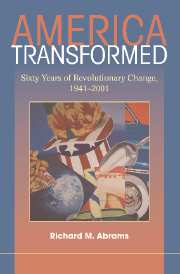5 - The Generational Chasm
Published online by Cambridge University Press: 05 June 2012
Summary
However new to Americans such acknowledged callousness may have been, it was hardly a historical novelty. But there were other “firsts” that postwar society would have to cope with. Social and technological change had been accelerating for more than 200 years. By the mid-twentieth century it had become a fundamental fact of life. The British philosopher Alfred North Whitehead had remarked earlier in the century how the ordering force of tradition had always depended on the assumption that “each generation will live amid the conditions governing the lives of its fathers and will transmit those conditions to mould with equal force the lives of its children. We are living in the first period of human history for which this assumption is false.” “The simple security of the old orthodox assumptions,” Whitehead noted, “has vanished. … The new situation in the thought of today arises from the fact that scientific theory is outrunning common sense.” The weakening of the force of tradition would take on new significance after 1945.
The conditions that would govern the lives of the postwar generations contrasted starkly with conditions for their parents. The values usually transmitted by custom and linking generations to one another would become increasingly tenuous. The first-person narrator in Wallace Stegner's 1971 novel, Angle of Repose, describes his son Rodman as a member of a generation “born without a sense of history.” “To him,” the narrator says, “it is only an aborted social science. The world has changed, Pop, he tells me. The past is not going to teach us anything about what we've got ahead of us. Maybe it did once, or seemed to.
- Type
- Chapter
- Information
- America TransformedSixty Years of Revolutionary Change, 1941–2001, pp. 21 - 24Publisher: Cambridge University PressPrint publication year: 2006



